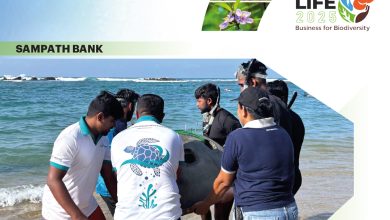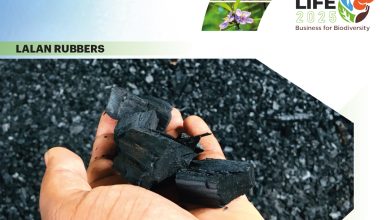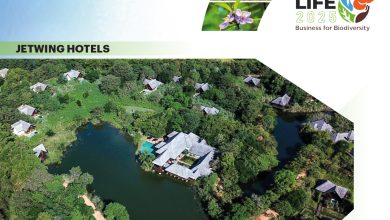BUSINESS FOR BIODIVERSITY
Biodiversity Means Business:
A Decade of Impact,
A Future of Action
A DECADE OF IMPACT AND A FUTURE OF ACTION
Shiranee Yasaratne urges private sector led action for a sustainable country
“For biodiversity conservation to truly take root, public awareness and education are essential”

Senior Technical Advisor
Biodiversity Sri Lanka
As Biodiversity Sri Lanka (BSL) celebrates its 10th anniversary, the organisation stands at a pivotal juncture – more committed than ever to driving biodiversity conservation in alignment with global goals while addressing Sri Lanka’s unique environmental challenges.
Founded in 2015, BSL has grown into a nationally recognised, private sector owned and led platform committed to environmental sustainability.
“BSL is a coalition that takes a lead role in providing a united business voice on biodiversity conservation actions in Sri Lanka. Working to assist companies in understanding biodiversity and related issues, as well as to mainstream it into their core businesses, BSL aims to ensure that most Sri Lankan companies will eventually be on a sustainable ecological footing with vastly reduced negative impacts on biodiversity,” Shiranee Yasaratne explains.
With a broad and diverse membership that spans national, multinational and SME businesses, BSL fosters collaboration between the corporate world and biodiversity and environmental conservation issues. The organisation provides technical support, shares knowledge, and promotes best practices through dialogue among state, civil society and corporate partners.
PATH FORWARD As BSL enters its second decade, the organisation is aligning its strategy with the 23 targets under the 2050 Kunming-Montreal Global Biodiversity Framework (GBF). Yasaratne says: “BSL is poised to play a pivotal role in driving Sri Lanka’s biodiversity conservation agenda as it reaches its tenth year of existence.”
Beginning in 2025, BSL will focus on four strategic action areas – protect and restore, prosper with nature, share benefits fairly, and invest and collaborate.
“BSL’s new strategic framework will align with the global biodiversity targets while addressing Sri Lanka’s unique ecological and socioeconomic context. By protecting ecosystems, promoting sustainable use, ensuring equitable benefits and mobilising resources, BSL will contribute meaningfully to the 2050 vision for biodiversity: Living in Harmony with Nature,” she adds.
CRITICAL ROLE Yasaratne underscores the rising importance of private sector engagement in environmental matters. “The role of businesses in leading positive change is crucial,” she says, pointing to global trends such as sustainability regulations, consumer demand for eco-conscious products and the risks of environmental degradation.
She elaborates: “The deterioration of the natural environment is making it increasingly difficult for millions of people to meet even basic subsistence needs. As Sri Lanka surges forward in its economic development drive, society is becoming less and less tolerant of environmental damage, and increasingly aware of the extent to which the economy depends on healthy and diverse ecosystems.”
“Successive international treaties and national strategies have committed the government to stem the tide of biodiversity loss… yet, the news is not any better lately. BSL steps in to help raise awareness on biodiversity and sustainability issues amongst the Sri Lankan business community,” Yasaratne adds.
GROUND CHALLENGES Despite the progress made, Sri Lanka continues to grapple with multiple threats to biodiversity. These include habitat loss, pollution, invasive species and climate change – all of which are intensified by human actions such as deforestation, unsustainable farming and unplanned urban development.
She explains: “Deforestation, driven by agricultural expansion and urbanisation, is a major driver of biodiversity loss. Industrial and agricultural runoff, as well as untreated sewage, contaminates water bodies, harming aquatic ecosystems and the species that depend on them.”
The introduction of non-native species can disrupt ecosystems, outcompete native species and lead to biodiversity loss. Yasaratne adds that shifting weather patterns, rising temperatures and sea level rise are impacting ecosystems, particularly coral reefs and coastal areas, and threatening endemic species.
Other concerns such as weak legal enforcement, and the clash between development and conservation goals, further complicate the landscape. She emphasises that “these challenges require a multi-pronged approach including strengthening protected area management, promoting sustainable land use practices, implementing effective pollution control measures, tackling illegal wildlife trade and building climate resilience.”

RAISING AWARENESS For biodiversity conservation to truly take root, public awareness and education are essential. “To make biodiversity conservation a priority in Sri Lanka, awareness and education must be strengthened through diverse and engaging methods targeting all segments of society,” Yasaratne stresses.
Strengthening awareness and education to make biodiversity conservation a national priority involves a multifaceted approach. This includes strengthening biodiversity education into school curricula, promoting community based conservation initiatives, and utilising media and technology to reach wider audiences.
She asserts: “Fostering collaboration between government, NGOs, businesses and local communities is crucial for effective conservation strategies. Fostering engagement and partnerships is crucial to implement comprehensive biodiversity conservation strategies.”
Encouraging public private partnerships (PPP) to mobilise resources and expertise for biodiversity conservation while encouraging businesses to adopt sustainable practices and investing in biodiversity conservation initiatives have become priorities today.
LOOKING AHEAD As BSL marks its 10th anniversary, the organisation not only celebrates its achievements but also looks to the future with renewed purpose. Embracing a strategic vision that places Sri Lanka’s biodiversity at the heart of sustainable development, BSL is embracing a strategic role.
With strong private sector participation, cross sector collaboration and community engagement, BSL is set to remain a catalyst for meaningful and lasting environmental change in Sri Lanka.





